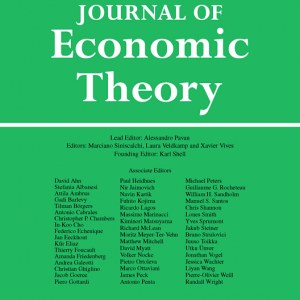
Hommes, C. and Zhu, M. (2014). Behavioral learning equilibria Journal of Economic Theory, 150:778--814.
-
Affiliated author
-
Publication year2014
-
JournalJournal of Economic Theory
We propose behavioral learning equilibria, where boundedly rational agents learn to use a simple univariate linear forecasting rule with correctly specified unconditional mean and first-order autocorrelation. In the long run, agents learn the best univariate linear forecasting rule, without fully recognizing the more complex structure of the economy. An important feature of behavioral learning equilibria is simplicity and parsimony, which makes coordination of individual expectations on such an aggregate outcome more likely. In a first application, an asset pricing model driven by AR(1)AR(1) dividends, a unique behavioral learning equilibrium exists characterized by high persistence and excess volatility, and it is stable under learning. In a second application, the New Keynesian Phillips curve, multiple equilibria coexist, learning exhibits path dependence and inflation may switch between low and high persistence regimes.